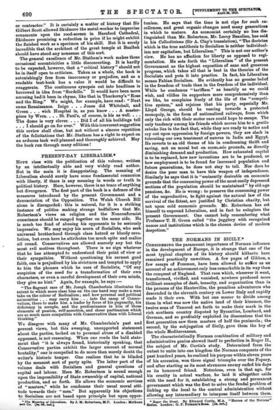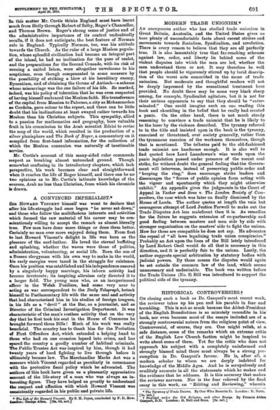THE NORMANS IN SICILY.*
CONSIDERING the paramount importance of Norman influence in the development of Europe, it is strange that one of the most typical chapters of its history should hitherto haw remained practically unwritten. A few pages of Gibbon, a few essays of Freeman, have been allowed to sufice as an account of an achievement only less remarkable in its way than the conquest of England. That race which, wherever it went, transformed, vivified, and vanished, nowhere produced more brilliant examples of dash, tenacity, and organization than in the persons of the Hautevilles, the penniless adventurers who descended in the eleventh century on Lower Italy and rapidly made it their own. With but one manor to divide among them in what was now the native land of their kinsmen, the twelve sons of Tancred set forth to make their mark in the rich southern country disputed by Byzantine, Lombard, and German, and so profitably exploited its dissensions that the first generation saw them masters of half the peninsula ; the second, by the subjugation of Sicily, gave them the key of the whole Mediterranean.
The characteristically Norman combination of military and administrative genius showed itself to perfection in Roger IL, the subject of Mr. Curtis's study. Determined from the outset to unite into one kingdom the Norman conquests of Um past hundred years, he realized his purpose within eleven years of his accession, won three signal triumphs over the Papacy, and after starting as its most strenuous enemy ended his days as its honoured friend. Notorious, even in that age, for his cruelty in actual warfare, he laid it altogether aside with the need for it, establishing a strong and permanent government which was the first to solve the feudal problem of linking up the local to the central administration without allowing any intermediary to interpose itself between them.
• Roger the Great. By Edmund Curtis, M.A. "Heroes of the Nations" Series. London; G. P. Putnam's Sow. [5s. net.] In this matter Mr. Curtis thinks England must have learnt much from Sicily through Robert of Selby, Roger's Chancellor, and Thomas Brown. Roger's strong sense of justice and of the administrative importance of its control undoubtedly recalls, if it does not anticipate, the best feature of Norman rule in England. Typically Norman, too, was his attitude towards the Church. As the ruler of a large Moslem popula- tion, whose splendid civilization had become an integral part of the island, he had no inclination for the pose of zealot, and the preparations for the Second Crusade, with its risk of rousing a united Islam, were altogether unwelcome to his scepticism, even though compensated in some measure by the possibility of striking a blow at his hereditary enemy, Byzantium, and of obtaining the throne of Antioch—a scheme whose miscarriage was the one failure of his life. So marked, indeed, was his policy of toleration that he was even suspected of having himself embraced the Moslem faith. His transference of the capital from Messina to Palermo, a city as Mohammedan as Cordoba, gave colour to the report, and there can be little doubt that his inclinations at least swayed rather towards his Moslem than his Christian subjects. This sympathy, allied to a passion for mathematics and geography, bore valuable fruit in his commission to the Arab scientist Edrisi to revise the map of the world, which resulted in the production of a silver planisphere and The Book of Roger, a commentary on it compiled from first-hand information, for the collection of which the Moslem connexion was naturally of inestimable service.
Mr. Curtis's account of this many-sided ruler commands respect as breaking almost untouched ground. Though somewhat confusing in its introductory chapters, which lack perspective, his work becomes clear and straightforward when it reaches the life of Roger himself, and there can be no two opinions as to Mr. Curtis's intimate knowledge of the sources, Arab no less than Christian, from which his chronicle is drawn.



























































 Previous page
Previous page